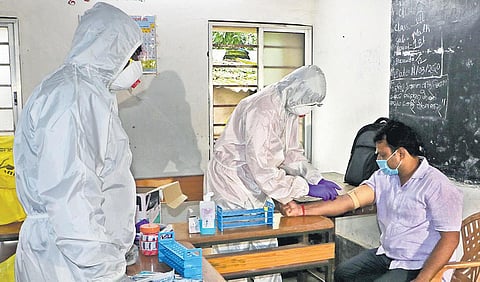

BHUBANESWAR: The Indian Council of Medical Research (ICMR) on Saturday rolled out the first serial serosurvey in Bhubaneswar, a Covid hotspot of the State.
The exercise is being undertaken to ascertain whether there is any community transmission of Covid-19 in the Capital city along with the extent of the spread of the virus in the population.
Five teams from the Regional Medical Research Centre (RMRC) here collected the blood samples of people in different identified clusters using multistage random sampling method. The survey will be conducted in two rounds.
Around 2,500 blood samples will be collected in the first round spanning 12 days. Around 900 samples from the general population and 1,600 samples from those at high risk will collected during this period.
The Bhubaneswar Municipal Corporation is assisting the ICMR teams in this survey It has identified 25 wards - 2, 4, 7, 14, 17, 19, 27, 29, 32, 40, 42, 45, 54, 56 and 59 - for collection of samples.
On the first day, the survey teams assisted by ward-level officers and Covid sachetaks collected around 530 samples from different localities across 15 wards which include Sailashree Vihar, Niladri Vihar, Chintamaniswar, Old Town, Care Hospital area, Palasuni, Hansapal and GGP Colony.
The remaining 370 samples will be collected from 10 other wards on Sunday.
The collection of 1,600 samples from people in the high risk groups will be started in the next week and will be completed by July 20.
After a gap of around 28 days, ICMR will conduct the second round of survey in the city. Officials at RMRC said, tests will be conducted in the first phase from Monday after all 900 samples are collected.
“As per the strategy, samples at community level are being collected randomly from slums and non-slum areas. The samples to be collected from high risk groups include immunocompromised patients, health care workers, security personnel, mediapersons, municipal workers, drivers, shop keeper, vendors, airport staff and those living in migrant camps and containment zones,” said Municipal Commissioner Prem Chandra Chaudhary.